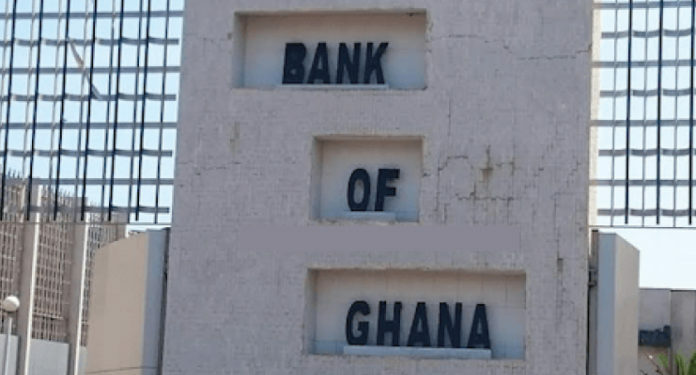Bank of Ghana Raises GHS 718 Million Through 56-Day Bills at 27% Interest Rate
The Bank of Ghana (BoG) successfully raised GHS 718 million through its latest issuance of 56-day bills, auctioned on Thursday, January 2, 2024, at an interest rate of 27 percent.
Despite the lack of disclosed bid values from primary dealers and the absence of a stated target, this auction underscores the Central Bank’s commitment to managing liquidity and ensuring monetary stability within the banking system.
Central Bank bills, such as the 56-day securities issued by the BoG, play a critical role in Open Market Operations (OMO), acting as a vital monetary policy tool to regulate the money supply. These short-term securities enable the Central Bank to influence liquidity levels in the financial system, thereby controlling inflationary pressures and ensuring economic stability.
The auction’s interest rate of 27 percent reflects the BoG’s monetary policy stance and the prevailing economic conditions. By setting this rate, the Central Bank sends a clear signal to the market about its strategy to influence borrowing costs, stabilize the currency, and manage inflation.
Objectives of the Auction
The proceeds from the auction serve two primary purposes. First, they assist in managing liquidity within the banking sector by mopping up excess funds, which helps to curb inflation and stabilize the economy.
Second, they provide short-term funding to the government, supporting fiscal needs without relying excessively on external borrowing or other funding mechanisms.
Significance of BoG’s Actions
This auction is indicative of the BoG’s proactive approach to addressing Ghana’s economic challenges. With inflationary pressures and fiscal constraints still prominent, the Central Bank continues to deploy monetary policy tools effectively to maintain financial stability.
By fine-tuning liquidity levels, the BoG ensures that the financial system operates smoothly, while also aligning its policies with broader economic objectives.
The auction also highlights the delicate balance the Central Bank must maintain between tightening monetary policy to control inflation and fostering an environment conducive to economic growth.
The interest rate of 27 percent, while high, is a reflection of the current economic climate and the need to attract investors to the government’s securities.
Looking Ahead
As Ghana’s economic landscape continues to evolve, the role of such monetary policy instruments will remain pivotal. The effectiveness of the BoG’s strategy will be closely monitored by market participants and stakeholders, as it navigates the challenges of stabilizing the currency, managing inflation, and supporting economic recovery.
This latest auction reinforces the importance of Central Bank interventions in promoting economic stability and highlights the critical role of monetary policy in achieving long-term financial health for the nation.







